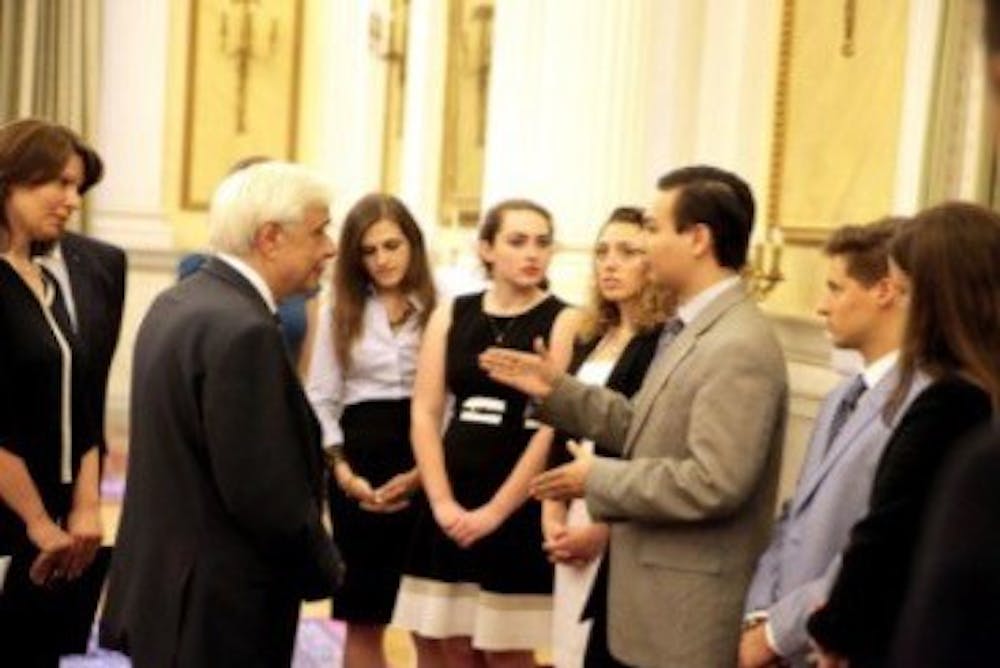While many teens spent the summer balancing internships, classes and beach outings, one Penn student was busy questioning a foreign head of state.
This past June, College sophomore Elias Gerasoulis joined a delegation of 10 college students who traveled to Cyprus and Greece to meet key political figures in the Eastern Mediterranean. The trip came at a key time in Greek history — the collapse of its economy. The trip, which lasted from June 19 to July 3, was organized by the American Hellenic Institute, a Washington D.C.-based organization dedicated to advancing domestic and foreign policy issues that affect Greeks and Greek Americans.
Gerasoulis, who is half-Greek by descent — his father was born in a small farming village in the mountains of northern Greece — had never been to Greece before this summer, nor had he any significant contact with his relatives in Greece. He had regularly talked about politics at home, but those conversations focused mainly on American issues.
“I thought this would be a tremendous opportunity both to deepen my level of knowledge — both in an academic and visceral level — and also really engage in discussion with some of these really international issues,” Gerasoulis said.
After a week in Cyprus, where Gerasoulis met a number of Cypriot academics and several key dignitaries, including the president of the Cypriot House of Representatives and the archbishop of Cyprus, the AHI delegation arrived in Greece on June 25, around the time that the Greek government was introducing capital controls to limit the amount of cash Greek citizens could withdraw daily from the banking system.
The student delegates stayed at a hotel near Syntagma Square — “Constitution Square” in English — in Central Athens, where many of the protests against the bailout negotiations occurred. The vast majority of media coverage of the bailout crisis’ aftermath was filmed or compiled there.
“We could literally see the lines of people at the ATMs. We could sense people’s desperation,” Gerasoulis said.
Over the following week, the student delegation met with officials from across the breadth of Greek politics, including the deputy minister of defense, foreign and economic policy experts and many members of the Hellenic Parliament.
Gerasoulis also got to meet the chairman of the Hellenic Financial Stability Fund, George Michelis, who has been tasked with preserving the stability of the Greek banking system. The meeting occurred on the same day that capital controls went into effect in Greek banks. Few people in Greece were more exasperated by the breakdown of Greece’s financial sector than Michelis was.
“We got information that you could not get from online news sources or television,” Gerasoulis said of their meeting.
One of the high points of the trip was meeting Greek President Prokopis Pavlopoulos at Athens’ Presidential Mansion. After a televised address praising the students for their role in improving U.S.-Greek relations, Gerasoulis asked President Pavlopoulos about his long-term vision for Greece’s future.
“Greece’s leaders need to understand that they are masters of perception, that they can inspire people to really raise their standards and break through difficulty,” Gerasoulis said.
In this respect, Gerasoulis and several other students were dissatisfied with the president’s answer of “you should have come to Greece in 2004. Everything was wonderful and prosperous then.”
Many meetings focused on economic matters that had either led to or worsened Greece’s financial crisis, including a weak judicial system, the lack of investment opportunities in Greece’s closed private sector and the stranglehold that Greece’s elite has maintained on the economy.
“They not only need to reduce debt and deficit. They have to increase GDP. They haven’t unshackled the Greek economy from the byzantine regulations that are holding it back,” Gerasoulis said, adding that he does not believe austerity will work if it is implemented abruptly and expected to solve the problem quickly.
But as much of a learning experience as it was, some of Gerasoulis’ fondest memories of the trip were encountering Greek relatives with whom he had previously had little to no contact.
“I wasn’t sure if I would ever even visit Greece, and to meet some of my relatives was wonderful,” Gerasoulis said.
On his one day off from official meetings, Gerasoulis saw his first cousin, Penelope, who lives in Athens with her daughter and husband, a ship captain.
“We took a 30-minute trip driving next to the Aegean Sea — which was beyond beautiful — and then went to this local fish tavern outside Athens.” Even though Gerasoulis seldom eats fish, he admitted that it was some of the best seafood he had ever eaten.
The day he met with President Pavlopoulos, Gerasoulis received a call from Penelope, who had seen him with the president on TV. Meanwhile, back in New Jersey, Gerasoulis’ father was fielding calls from relatives exclaiming that they had just seen his son on the news.
“It was very extraordinary,” Gerasoulis said. “My dad grew up in that country, and for his son to meet its president is very touching.”
The Daily Pennsylvanian is an independent, student-run newspaper. Please consider making a donation to support the coverage that shapes the University. Your generosity ensures a future of strong journalism at Penn.
DonatePlease note All comments are eligible for publication in The Daily Pennsylvanian.






